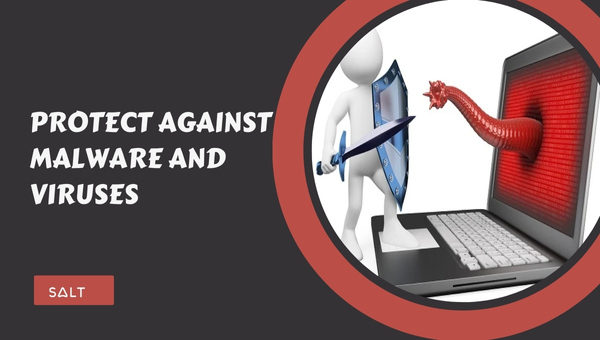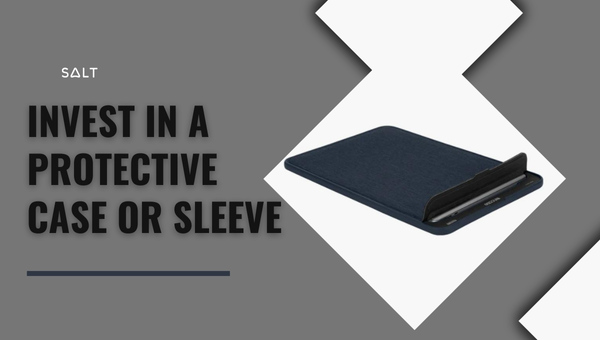15 Ways On How To Extend The Life Of Your Laptop [2024 Guide]
Did you invest in a brand-spanking-new laptop, or perhaps you're navigating the digital world on an experienced machine? Either way, you must know how to extend the life of your laptop: 15 habits to increase lifespan.
A laptop is quite a major investment, so why wouldn't you want to ensure it lasts as long as possible? Gleaning years of usage from a single device is a money-saver and an eco-friendly approach.
With simple and easy-to-follow habits, you can significantly elongate your computer's lifecycle. Following these 15 savvy methods will increase your laptop's lifespan and ensure its performance stays at its peak for years.
You'll be surprised just how much impact regular cleaning and good habit-forming can have on your laptop’s longevity and efficacy.
Skip Ahead
How To Extend The Life Of Your Laptop: 15 Habits To Increase Lifespan

There's no denying that a laptop is an indispensable tool that lends itself to various uses. You might rely on it for work, education, entertainment, or any combination. Whichever category you fall into, longevity certainly matters.
Here are 15 habits you can adopt to guarantee your beloved machine accompanies you through many years of productivity and leisure.
Regularly Update Software And Drivers

Updating your software and drivers is vital to extend your laptop's life. These updates often come with bug fixes, improvements to efficiency, and patches for security vulnerabilities.
Keeping your operating system, applications, and drivers up-to-date ensures optimal performance and protection against potential threats.
You can easily do this by enabling automatic updates in your system settings or manually checking for updates from the software providers' websites.
Keep The Laptop Clean And Dust-free
Maintaining cleanliness is crucial to extending the life of your laptop. Dust and grime accumulation can obstruct the ventilation system, leading to overheating.
It is advisable to use compressed air to clean the keyboard and air vents regularly. Avoid eating or drinking near the laptop to prevent spillage or crumbs getting stuck.
Also, consider using a soft microfiber cloth to regularly wipe down the laptop's screen, keyboard, and outer surfaces.
Doing so will keep your device running smoothly while maintaining an attractive aesthetic appearance.
Use A Cooling Pad Or External Fan
A cooling pad or an external fan is a proactive step to mitigate overheating issues and extend your laptop's life.
These accessories are designed to provide extra ventilation, reducing the heat your device generates. Cooling pads come with built-in fans that help dissipate heat away from the laptop, while external fans can be pointed at the device to provide airflow.
Both options can improve thermal management, especially during intense usage or when the laptop is used in warm environments.
Maintaining a suitable working temperature for your laptop will ensure longevity and optimal performance.
Also Read: How To Choose The Perfect Laptop For Your Academic Journey
Avoid Placing The Laptop On Soft Surfaces
Avoid placing your laptop on soft surfaces like beds, sofas, or pillows, as these can hinder proper ventilation. Blocking the laptop's vents can cause it to overheat, leading to slowed performance and potential damage to internal components over time.
Instead, it's recommended to always use your laptop on a hard, flat surface that allows air to circulate freely.
If you require a laptop on a softer surface, consider using a portable desk or a lap desk explicitly designed for laptops.
Protect Against Malware And Viruses

Protecting your laptop against malware and viruses is crucial in increasing its lifespan. Such threats can significantly slow down your computer, cause harmful system crashes, and even result in data loss.
Always have reliable antivirus software installed and keep it updated. Also, be cautious while browsing online or opening email attachments from unknown sources, as these can be potential routes for malware.
Regularly back up your data to an external hard drive or cloud storage as an extra precaution against attacks.
Consider using a firewall and keeping all software, including your operating system, up-to-date with the latest patches and fixes to further guard against security threats.
Defragment And Optimize The Hard Drive
Defragmenting and optimizing your hard drive is another effective way to boost the longevity and performance of your laptop.
Over time, as you add and delete files, data on your hard drive can become fragmented, leading to slower response times as your laptop has to search across disjointed memory areas. Defragmentation reshuffles this data so that related pieces are closer together for faster access.
You can perform defragmentation using in-built tools provided by your operating system or third-party software solutions. Regularly optimizing your hard drive can significantly enhance the speed and efficiency of your laptop's operations.
Upgrade Hardware Components When Possible
Upgrading hardware components when possible is an effective strategy to extend your laptop's life. This could involve increasing the RAM for better multitasking, upgrading to a solid-state drive (SSD) for faster data access, or changing the battery if it's not holding charge as well as it used to.
Upgrading components enhances your laptop’s performance and extends its usable life, saving you the cost of prematurely buying a new one. This approach may not be feasible for all laptops as some models don't allow certain hardware upgrades or modifications.
Avoid Overcharging The Battery
To ensure your laptop's battery remains in good condition, avoid overcharging it. Keeping the charger connected even when the battery is fully charged can degrade its lifespan due to heat generated from excessive charging.
It's recommended to disconnect the charger once your laptop battery reaches 100% and reconnect it when it falls to around 20%.
Some laptops have a built-in battery care function that caps the charge at a certain level (80-90%) to prevent overcharging. If your laptop has this feature, use it for better battery health.
Also Read: How To Replace Laptop Battery [Step By Step Guide]
Delete Cookies And Temporary File
Maintaining optimal performance of your laptop involves regularly deleting cookies and temporary files.
Using your web browser creates a cache of temporary files and cookies, accumulating over time, taking up valuable storage space, and potentially slowing down your system.
Deleting these regularly can help free up space on your hard drive and keep your system running smoothly.
Doing this regularly can also help protect your privacy by erasing browsing data containing sensitive information.
Handle With Care To Avoid Physical Damage
It's important to handle your laptop with care to avoid physical damage. Do not drop, shake, or hit your device; these actions can lead to broken parts or hard drive failure.
When opening the screen, always do so slowly and avoid exerting pressure on the screen or keyboard. Make sure not to carry your laptop by its display, as this could strain the hinges and cause problems over time.
Using a protective case or bag designed for laptops can provide excellent cushioning and damage protection during transport and storage.
Use A Surge Protector

Power surges can damage your laptop's internal components, so it's recommended to use a surge protector.
A surge protector absorbs any excess electrical energy, protecting your device from sudden spikes in voltage that could cause damage.
Plug-in surge protectors are an affordable and easily accessible option, or you could choose a laptop power adapter with built-in surge protection for added convenience and peace of mind.
Remember to unplug your laptop during a thunderstorm, as these conditions can lead to more severe power surges.
Close Unnecessary Programs And Tabs
Preserving your laptop's processing power and memory efficiency involves closing unnecessary programs and tabs. Having too many applications running or numerous web browser tabs open can consume significant system resources, slowing down your device and causing it to work harder than necessary.
To avoid this, keep an eye on your active programs and only keep those you actively use open. You can manage these through your device's task manager.
Cutting back on the number of open applications and web pages makes your laptop run faster and extends its lifespan by reducing unnecessary strain.
Backup Data Regularly
Backing up your data regularly is a proactive measure that doesn't directly extend your laptop's life but protects your valuable information in case your computer fails or crashes. Implementing regular backups ensures you'll always have access to important files and documents when you need them.
Several methods to back up your data include using cloud storage services like Google Drive or Dropbox, external storage devices like USB drives or hard drives, or backup tools built into your operating system.
With consistent backups, even if something goes wrong with your laptop, your important data will remain safe and accessible.
Limit Exposure To Extreme Temperatures
Minimize your laptop's exposure to extreme temperatures whenever possible. Excessive heat can lead to overheating and damage critical internal components, while extreme cold can cause condensation inside your laptop, leading to potential corrosion or electrical issues.
Always try to use your laptop in a controlled environment within standard room temperatures. If your computer has been in an especially cold or hot climate, allow it time to gradually adjust to room temperature before using it. Following this advice can help maintain your device's longevity and efficient functioning.
Also Read: How To Reduce CPU Temperature [Effective Ways]
Invest In A Protective Case Or Sleeve

A protective case or sleeve is a good investment to protect your laptop from day-to-day wear and tear. These accessories protect your device from scratches, dings, and impacts that could harm its external body or internal components.
Choose a well-padded case or sleeve that fits your laptop snugly, with considerations for extra pockets if you need space for chargers, cables, or peripherals.
A well-chosen laptop case or sleeve provides functional benefits and adds to your device's personalization and aesthetic appeal.
FAQs about Laptop Lifespan
What are some easy ways to extend my laptop's lifespan?
Regular software updates, keeping it clean and dust-free, and using a cooling pad can all help.
How can I avoid damaging my laptop's battery?
It's best to avoid overcharging your battery and exposing it to extreme temperatures.
What can I do to prevent my laptop from overheating?
Don't place it on soft surfaces that block ventilation. Using a cooling pad or an external fan can also be beneficial.
Are software updates really necessary for my laptop’s longevity?
Yes, updating your software keeps your laptop running smoothly and securely, which aids in its longevity.
Can dust damage my laptop?
Too much dust inside your laptop can cause overheating, shortening its lifespan. Regular cleaning is essential!
Conclusion
To wrap it up, prolonging your laptop's life doesn't require a computer science degree - just a bit of care and maintenance. These 15 tips offer simple yet effective ways to ensure that your digital companion continues to serve you well for years.
Just remember, the best time to start cultivating these habits is now. Whether you're the proud owner of a shiny new laptop or cherishing an older model, these practices are surefire ways to squeeze more productive years out of your device.

Markus Braasch
After growing up in Germany I decided to take a brief break from entrepreneurship to study in the US. This led to meeting my beautiful wife and starting our life together in South Carolina. Written content has transformed my life. I enjoy sharing this passion with others. Please connect with me on social and let me know your thoughts on this article so my next one can be better.
